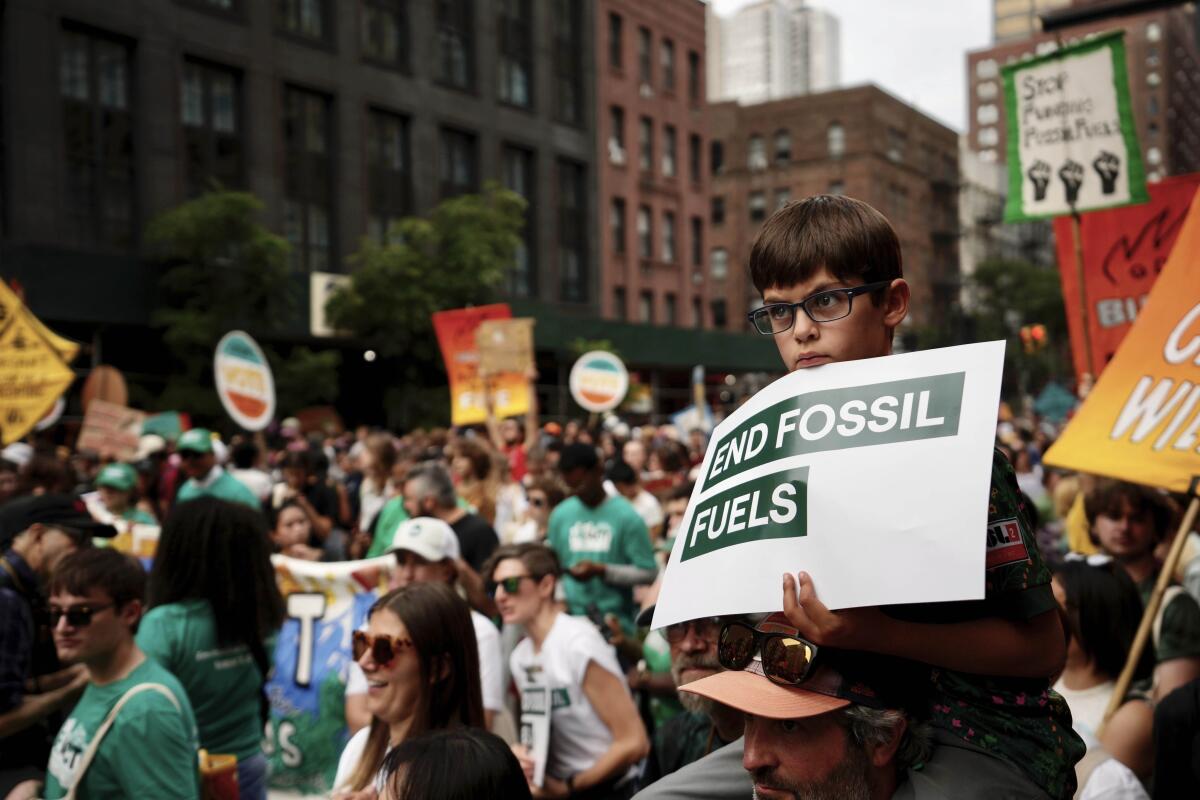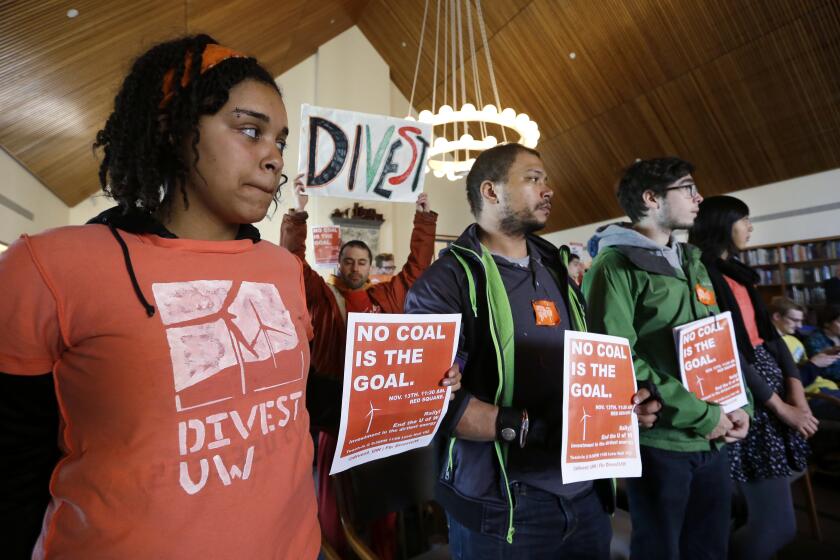Opinion: How climate research is polluted by fossil fuel money — and how to fix it

- Share via
When Sultan Al Jaber, the president-designate of COP28, unveiled plans for a first-ever Day of Health at the upcoming United Nations-sponsored climate summit, he noted his “resolute” determination to “address the challenges posed to health by climate change.” The announcement was welcome given the climate-fueled health crises that now regularly strike our patients, including heat stroke, insect-borne diseases like Lyme and childhood asthma arising from wildfire smoke exposure.
But it was also ironic: The man promising to “shine a light” on the deadly effects of fossil fuel pollution heads an oil company that’s raking in profits while ramping up emissions.
Although Al Jaber’s contradictory roles are no secret, his situation points to a broader web of conflicts of interest that endangers climate progress. From official reports of the Intergovernmental Panel on Climate Change, where the sway of oil and gas companies has watered down language on fossil fuels, to universities and think tanks, climate research and policymaking is awash in influence-peddling.
Climate change is already harming hospital patients, and fossil fuels are a bad bet financially too.
As medical doctors who treat climate-related diseases and regularly navigate conflicts of interest, we are frustrated, but not surprised, by this lack of transparency. We’ve seen first-hand the pressure that commercial interests have exerted on our field. But basic guardrails in medicine have shown it’s possible to work with industry without compromising ethics. The rules to partition patients from profits should be a guide for climate policy reform.
Modern medicine has long been in tension with private enterprise. In recent decades, a series of scandals exposed problematic relationships between doctors and industry. In 2000, authors of two separate pharmaceutical-sponsored trials of arthritis medications incompletely reported results, underestimating the risk of Vioxx-related heart attacks and overstating the health benefits of Celebrex. (Vioxx was later withdrawn from the market; Celebrex was slapped with a black box warning.)
But it’s the opioid epidemic that best exemplifies corporate greed infecting medicine. Purdue Pharma, the maker of Oxycontin, funded research that downplayed the addictive properties of their drugs and paid physicians to juice up opioid prescribing.
This kind of behavior understandably erodes trust in medical science. But over time, physicians, hospitals and medical journals have put in place conflict of interest guidelines that, while imperfect, have helped lessen inappropriate influence in medicine. Government intervention has made a difference too.
Why hundreds of scholars are calling for schools to reject oil and gas company money.
The first critical step is disclosure. Before lecturing in a medical education course or professional meeting, physicians have to complete a form listing all industry associations and attesting that that their lecture will be unbiased and will not promote commercial interests. When presenting, we also display a slide listing companies that have provided financial support. Scientific journals have implemented a disclosure document that addresses patents, royalties, speaking and consulting fees and other potential conflicts. (At the New England Journal of Medicine, where one of us works, authors of review articles and editorials may not have significant financial interests in companies that make products related to the topic.)
Many medical schools require publicly accessible faculty disclosures and have cracked down on industry-sponsored lunches and gifts. And professional organizations like the American Thoracic Society have enacted tobacco-free funding pledges.
Climate advocates have petitioned for similar rules on fossil fuel money but so far, the reaction in academia has been muted. At Harvard, activists raised concerns this past year over law professor Jody Freeman — a co-chair of the university’s Presidential Committee on Sustainability and recipient of a grant from the university’s new climate institute — serving on the board of ConocoPhillips, which is behind the Willow oil drilling project. Despite receiving more than $350,000 in yearly compensation from the company, Freeman — who ultimately resigned from its board — did not violate Harvard policies, underscoring the need for stronger regulations in academics.
Some of the world’s most populous places, including parts of India, Pakistan and the Middle East, face extended intolerable conditions.
Freeman, Al Jaber and others have argued that decarbonization requires collaboration, claiming that industry know-how paired with academic engagement will extract us from the climate quagmire. But the gaping chasm between fossil fuel companies’ rhetoric around clean energy and their actual pursuit of it suggests not. Instead, involvement in academia may provide oil and gas companies a sheen of respectability while potentially influencing those whose research and scholarship drive climate policy.
At the bare minimum, places where climate research and policy originate — universities, research institutes, conferences and scientific journals — should require mandatory disclosure of fossil fuel funding. Under pressure, COP28 has required oil lobbyists to identify themselves as such. However, in a recent report issued by a Harvard alumni group, a majority of that university’s surveyed departments were still “reluctant or unable to publicly disclose” fossil fuel funding.
Imagine if at the outset of a talk on carbon capture, the speaker had to list their industry payments just as we do prior to a medical lecture. Disclosures would put experts on record while helping their audience discern potential bias; they could be verified by cross-referencing an online database akin to Medicare’s Open Payments system that tracks pharmaceutical payouts to physicians.
Still, disclosure alone is not enough. Money talks, even in small increments. Concerns over industry funding — such as at Stanford’s Doerr School of Sustainability — have led advocates to demand stringent regulations around, if not outright bans on, fossil-fuel-funded climate change research similar to those prohibiting tobacco money at medical conferences.
At COP28, it remains to be seen whether the president-designate can juggle his dual obligations to his employer and to the rest of us. But across climate work, our health depends on creating rules to ensure transparency and independence.
Alexander Rabin is a clinical assistant professor of pulmonary and critical care medicine at the University of Michigan. Caren Solomon is an associate professor of medicine at Harvard Medical School. Both are members of the advocacy group Climate Code Blue.
More to Read
A cure for the common opinion
Get thought-provoking perspectives with our weekly newsletter.
You may occasionally receive promotional content from the Los Angeles Times.













